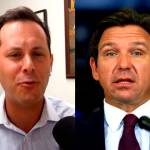
Big Pharma Puppet Groups Are Keeping Your Drug Prices High
May 22, 2025
Criminal Probe Launched Into DeSantis-Linked Charity
May 22, 2025Thanks to everyone who came to the AMA last night at r/thebulwark. I appreciate you showing up. If you missed it, you can read the whole thing here.
Last fall, when everything seemed possible, Jamie Dimon had no interest in stopping Donald Trump.
He declined to endorse Kamala Harris, despite privately saying he preferred her.
Then, after Trump won, Dimon tried to curry favor with the president. He effused that bankers were “dancing in the streets” because of Trump’s victory.
He explained that the reason Americans had voted for Trump was that
People were angry at the—what do they call it?—the state, the swamp . . . ineffective government . . .
People wanted kind of more pro-growth and pro-business policies. They didn’t want to be lectured to on social policies continuously.
Such an interesting observation. Did you notice that Kamala Harris campaigned on social policies? That she did so continuously? That her tone was that of a lecturer?
I did not. I heard a candidate talking about small businesses, economic growth, free trade, and making the U.S. military the most “lethal” fighting force in the world.
Trump, on the other hand, talked mostly about imposing tariffs, deporting tens of millions of immigrants, and shredding the rule of law—all things that would hobble the American economy.
Maybe Dimon was watching Twitter fights and not the candidates running for president?
Or maybe Dimon was just reporting the sentiments he gleaned from talking to the great unwashed: “Travel[ing] around the country. I felt it wherever I went,” he explained.
I wonder: Whom do you think Jamie was talking to as he traveled “around the country”? Was he at the Waffle House dining with Cletus and Lurleen? Was he rubbing elbows with Real Americans at the Motel 6 concierge desk?
But let’s press on.
In January, as Trump came to power and began his tariff dance, Dimon ran cover for him again. His message to people who were concerned that tariffs might hurt the economy? “Get over it.”
No, really. That’s what he said. “If it’s a little inflationary, but it’s good for national security, so be it. I mean, get over it.”
As if the kinds of unilateral and irrational tariffs Trump was talking about imposing on Canada and Mexico (at the time) had anything to do with national security.
But this week Dimon suddenly came down with a case of Trump Derangement Syndrome. Speaking at a JPMorgan investor conference:
Dimon said the chances of elevated inflation and stagflation are greater than people think, cautioned that America’s asset prices remain high and said that credit spreads aren’t accounting for the impacts of a potential downturn.
“Credit today is a bad risk,” he said at the firm’s investor day on Monday. “The people who haven’t been through a major downturn are missing the point about what can happen in credit.” . . .
“People feel pretty good because you haven’t seen an effect of tariffs,” Dimon said. “The market came down 10%, it’s back up 10%; I think that’s an extraordinary amount of complacency.” . . .
Even at the lower levels, the levies remain “pretty extreme,” Dimon said. It’s unclear how countries will respond and it will also take time to ramp up manufacturing in the US, he added. Dimon also pointed out that corporate earnings estimates are likely to fall.
“I don’t think we can predict the outcome and I think the chance of inflation going up and stagflation is a little higher than other people think,” he said, also reiterating that geopolitical risks remain very high.
Weird. It’s almost as if the guy who spent the last six months dumping on anyone who tried to stop Trump, or warned that Trump was dangerous, suddenly found religion.
And yet, you’ll notice that nowhere in his remarks was there any acknowledgment that he had been wrong—dead wrong—about Trump.
But I suppose we should all just, you know, get over that, too.
The defense of Dimon is that of course he knew that Trump was dangerous, and that tariffs wouldn’t help national security, and that Trump’s chaotic nature would be bad for the economy.
He just couldn’t say any of that because he had to protect his company. He had to lie.
And of course he had lie about lying in order to make his sucking up to Trump believable. “I’ve always been an American patriot,” Dimon told reporters last October. “And my country is more important to me than my company.”
But what if his country wasn’t more important to him than his company? Then he would have to lie and insist on the opposite, right? No True Scotsman. Three-Dimensional Chess. Whatever.
So maybe Jamie Dimon is just an untrustworthy, mercenary businessman, happy to do or say anything to make his share price go up by a nickel.
Or maybe he’s an idiot who doesn’t understand America, or politics, or risk, or anything else outside of his tiny sphere of expertise.
Whatever the case, he sure is rich. There’s no question about that.
I don’t mean to abuse Dimon. I’m sure he’s a great guy and is much smarter than I’m giving him credit for being. Because this isn’t really about him. It’s about how the business class acts in the liminal space when a society may be transitioning from liberalism to autocracy; from free market to a command economy.
Great Job Jonathan V. Last & the Team @ The Bulwark Source link for sharing this story.







